AI empowers education and subverts the learning experience.
Learning a new language efficiently is a dream skill for many people. However, the reality is that even if you have logged in for thousands of days on Duolingo, you will still be at a loss for words when having actual conversations, because most language learning starts with reading and writing, while native speakers master the language by listening and speaking.
The language learning app Speak has grasped this point and built a language learning platform with "speaking" as its core with the help of generative AI. It helps users truly master a language through audio conversation exercises, rather than relying on a few phrases and textbook grammar.
In early December 2024, Speak completed a $78 million Series C financing round with a valuation of $1 billion. This round of financing was led by Accel, and OpenAI Startup Fund, Khosla Ventures and Y Combinator continued to increase their support. Just six months ago, Speak just completed a $20 million Series B financing. In just half a year, Speak successfully doubled its valuation. Ben Quazzo, partner of Accel, will join the board of Speak after the financing. He believes that Speak has become a leader in consumer AI, not only growing rapidly, but also showing huge market potential, redefining the language learning experience.
Listening > Reading and Writing = Explosive Growth
Since its inception, Speak has taken fluent language expression as its core technology. Although it is the most important part of learning a language, it has always received the least technical support. With the help of generative AI, Speak can fill this technical gap and split the language learning process into three steps, focusing on simulating a real language environment:
Start with listening and speaking:Abandoning complicated grammatical rules, let users directly enter the conversation. Founder Zwick explained: "We don't explain grammar point by point, but let users feel the language directly."
Repeated practice:Users repeat new phrases in a variety of contexts until they are proficient, without translation.
Real-situation application:Use AI-generated real-world dialogue to help users integrate language into actual use.
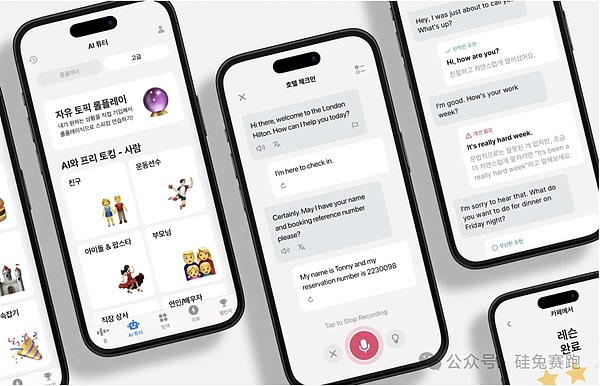
Speak interface
The entire process is completed by AI without any human intervention. Speech recognition, natural language processing and generative AI work together to accurately match user needs. OpenAI not only provides financial support for Speak, but its language model is also an important enabler of Speak technology. OpenAI has invested in Speak since 2022, hoping to jointly change the future of language learning with the help of generative AI technology.
Although the mode of allowing users to talk to machines and repeat practice is similar to language learning software such as Duolingo, Speak's focus on "listening" and "speaking" makes it stand out and is deeply favored by users. The average daily usage time of users is 10-20 minutes, and the subscription price is US$20 per month or US$99 per year, which is only a small part of the cost of hiring a real language tutor.
Since its launch, Speak has performed very well: the number of app downloads has exceeded 10 million times. This year alone, users have completed more than 25 million personalized courses, and the total number of foreign language sentences spoken by users on the platform has exceeded 1 billion. In South Korea, the first market, Speak has helped 6% of the Korean population to achieve English fluency through Speak. On the corporate side, more than 200 companies have chosen Speak as a language training tool for employees, with an employee usage rate of up to 85%.
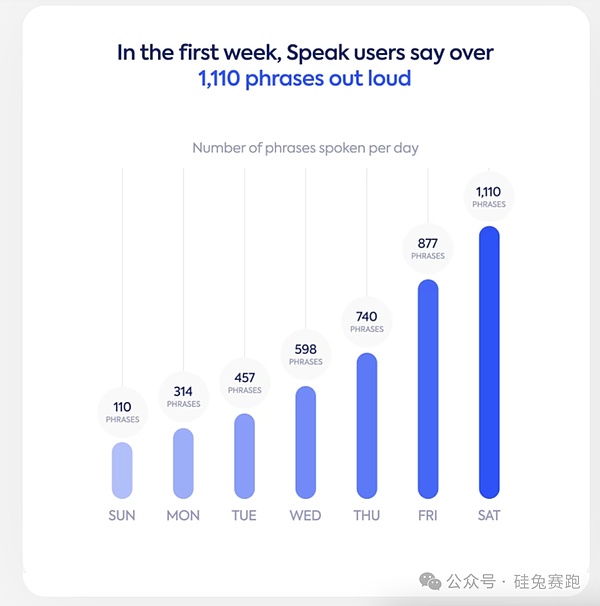
Phrases spoken by Speak users
Speak's ambitions are not limited to English. Currently, users can also learn Spanish. Its website also shows that learning in multiple languages such as French, German, Chinese and Japanese will be launched soon. Speak's learning method, which is based on "real conversations", provides language learners with a more immersive experience and greatly improves learning results, making Speak a dark horse in AI language learning.
AI Empowers Education: Subverting the Learning Experience
AI is reshaping the education industry at an astonishing speed. It can not only optimize the learning experience, but also change the core value of educational products. Not only language learning, many educational companies are exploring how AI can maximize learning efficiency. For example, Duolingo, one of the most popular language learning applications in the world, has attracted hundreds of millions of users with its easy and interesting gamification experience. In recent years, it has also increased its investment in AI, such as using AI to generate personalized exercises for users to ensure that the learning content is highly matched with the current level. Data shows that this function has increased user retention by 15%-20%; at the same time, the function of using AI to provide users with instant feedback has made 78% of users believe that this function reduces their frustration in learning and increases the course completion rate.
In 2023, Duolingo launched Duolingo Max, a premium subscription service based on GPT-4. Users can talk with AI characters to simulate real communication scenarios. Data shows that the average daily learning time of users using Duolingo Max is 30% higher than that of ordinary users, which directly drives the number of subscribers to grow by 62% year-on-year. These AI features have not only significantly increased Duolingo's user growth, but also improved users' learning experience and satisfaction. Since the launch of AI features, Duolingo's App Store rating has risen from 4.5 in 2022 to 4.7 in 2023. Benefiting from AI features and user growth, Duolingo's stock price has risen by more than 50% in 2023, from US$90 at the beginning of the year to US$140 at the end of the year.
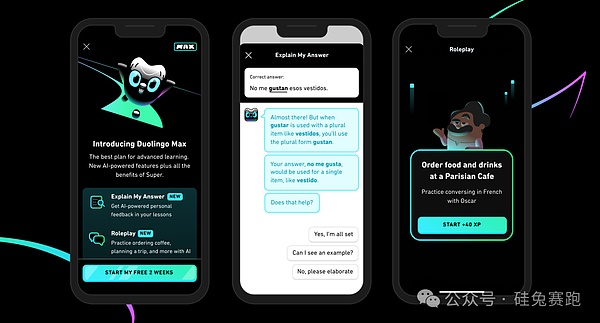
Duolingo max
At the same time, the emergence of AI has brought unprecedented impact on traditional online education platforms such as Chegg. As a former online education giant, Chegg mainly provides test preparation and homework tutoring services. However, the emergence of ChatGPT in 2023 brought a fatal threat to Chegg. For example, ChatGPT can quickly generate homework answers and study suggestions, directly replacing Chegg's core services, which makes users no longer willing to pay for Chegg's subscription model, resulting in serious user loss. Chegg's subscription revenue fell 7% year-on-year in the first quarter of 2023, and total revenue further declined to US$182.8 million in the second quarter.
Chegg tried to compete with ChatGPT through its self-developed AI tool "CheggMate", but due to the delayed launch and single function, it failed to reverse the situation, and its stock price plummeted from $30 in 2022 to $2 today. This impact shows that in the face of the rise of generative AI, if traditional education platforms cannot quickly adjust their strategies, they are likely to be completely marginalized.
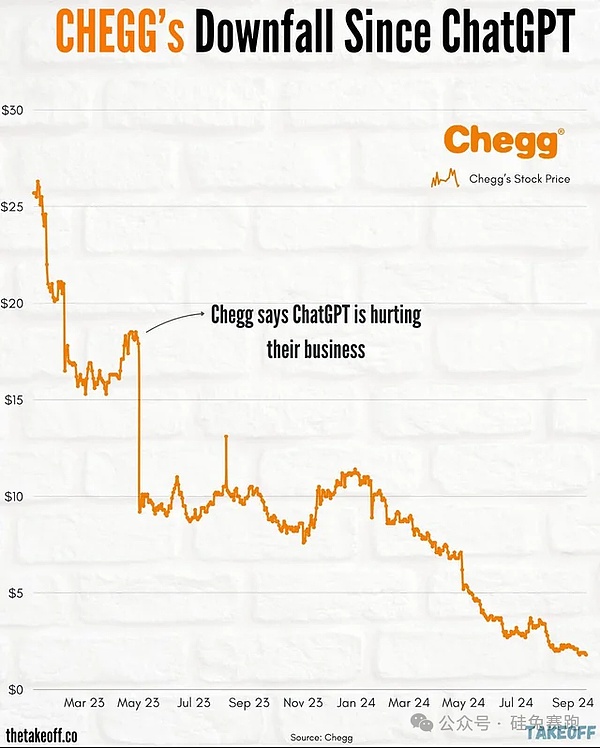
Chegg stock price trend
In the wave of AI, other educational products are also actively embracing this technology in order to break through the traditional model: Quizlet, an efficient learning card platform, has improved learning efficiency by 40% and increased new user registration by 30% through personalized learning paths and real-time interactive functions of generative AI; the AI tool "Khanmigo" launched by Khan Academy, an online education platform, can act as a virtual tutor to help students improve their test scores by about 15%; Elevate, a cognitive ability training application, uses AI to adaptively adjust the difficulty of questions, allowing users' memory and processing speed to increase by 25% in three months.
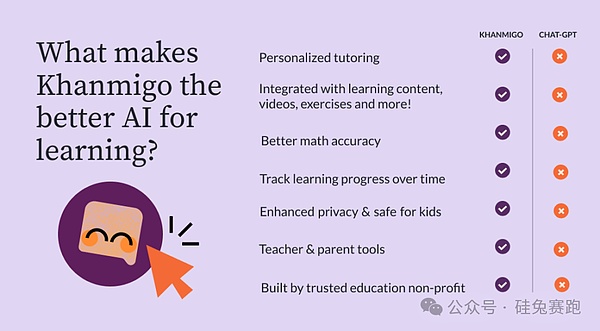
Khanmigo
The education industry has always been iterating at a slow pace, but the emergence of AI is breaking this deadlock at an astonishing speed. From improving learning efficiency to completely subverting business logic, AI has made "personalization" and "scalability" compatible for the first time, opening up a new growth space for education technology companies.
Platforms like Speak are perfect examples. They use generative AI to build a highly personalized learning experience, so that users' learning is no longer passive memorization, but dynamic practice. Voice recognition and contextual dialogue technology make "speaking" the core of language learning. This low-cost and scalable model not only allows more users to afford high-quality education services, but also provides education startups with business opportunities to rapidly expand the market.
The charm of AI education lies in that it makes learning closer to real scenes. The conversations and life scenes simulated by generative AI make users feel that they are not cold teaching tools, but a caring learning partner. The key to success is not how complicated the technology is, but how natural the user experience is. Whether it is Speak's immersive language learning or Quizlet's use of generative AI to optimize memory efficiency, these products are capturing users with intuitive and delicate experiences.
The innovation of the business model has raised the attractiveness of education to a new level. Subscription services provide companies with stable cash flow, and the continuous accumulation of user data can feed back product optimization to form a closed loop. More importantly, the rapid iteration of AI technology allows educational tools to enter more vertical fields at low marginal costs, extending from language learning to corporate training and even professional skills improvement.
AI has not changed the essence of education - helping humans learn more efficiently, but it is completely rewriting the rules of the education industry. When education becomes smarter, more inclusive and more people-oriented, the AI revolution has just begun. In this game, whoever can grasp the balance between technology and user experience may dominate the future of the education industry.
Reference source:
Language learning app Speak nets $20M, doubles valuation (TechCrunch)
Our Investment in Speak: The Language Learning App That Gets You Talking (Accel)
ChatGPT WRECKS Chegg's stock price (Superhuman AI)
 Alex
Alex
 Alex
Alex Joy
Joy Joy
Joy Brian
Brian Kikyo
Kikyo Brian
Brian Kikyo
Kikyo Alex
Alex Brian
Brian Kikyo
Kikyo